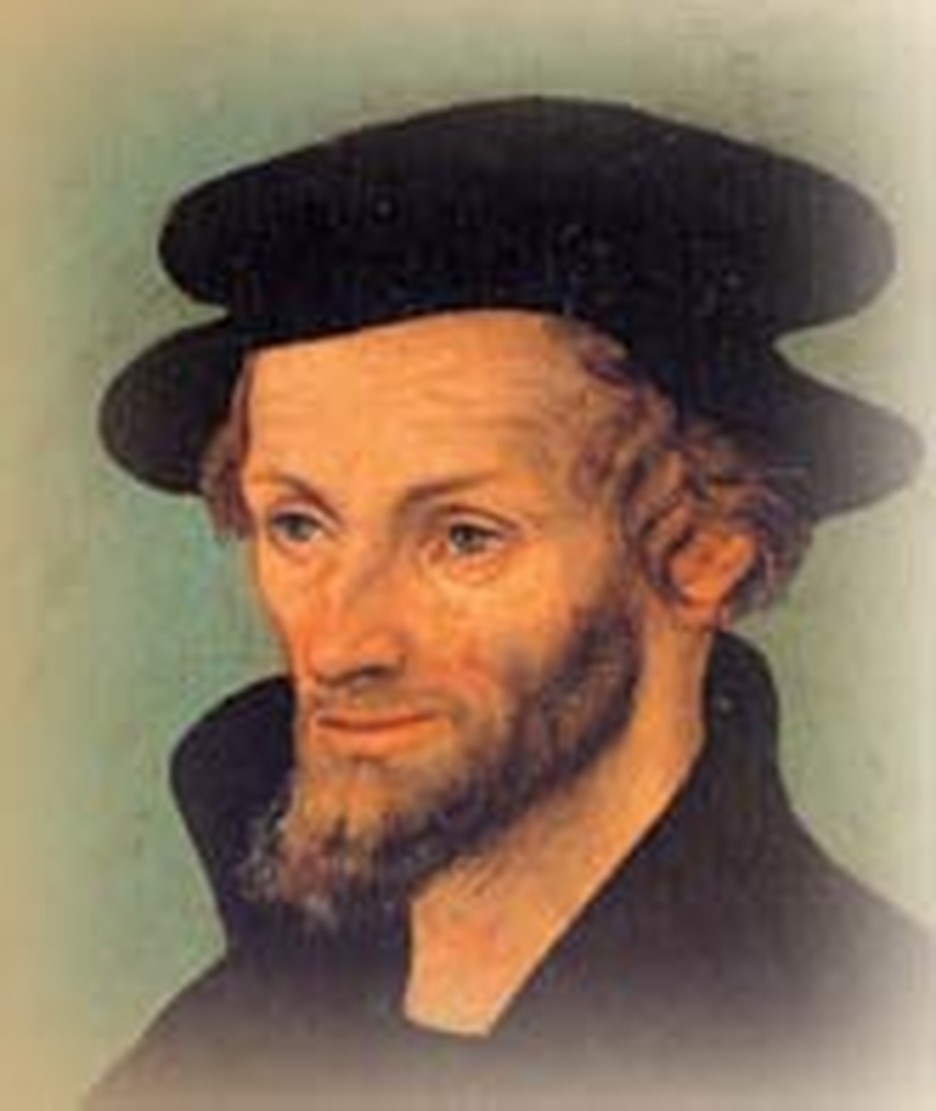
David and Jonathan; Paul and Silas; John Wesley and George Whitefield -- it’s interesting to look through history and notice how God brings certain people together to accomplish His purposes. One such pair of Christian servants was Martin Luther and Philipp Melanchthon. Philipp Melanchthon was fourteen years Luther's junior, but Luther had the greatest respect for the younger man and recognized how the Lord had united them to reform the Church of their day.
Black Earth Boy
Five hundred years ago, in 1497, five years after Columbus' first voyage, Philipp Schwarzerd was born in Southern Germany. He was a brilliant boy who received his B. A. from the University of Heidelberg when only twelve and received his Master of Arts from Tübingen when only seventeen. He had a great facility with ancient languages; he could speak Latin and Greek better than his native German. His uncle called him Melanchthon, Greek for "black earth," which was the German meaning of his name. He was built small and was somewhat timid, but his blue eyes were honest and filled with intellectual curiosity.
Inseparable Friends
When he was twenty-one, Melanchthon became Professor of Greek at the new University of Wittenberg. It was only ten months after Luther had posted his famous theses on the church door in Wittenberg. Melanchthon became totally devoted to Martin Luther, and a great friendship developed between the two. Both men sensed that God's Providence had a special mission for them to do together. Melanchthon venerated Luther as a father, while Luther deeply respected Melanchthon and learned from him. Melanchthon said he would rather die than be separated from Luther.... Martin's welfare is dearer to me than my own life. Even so, the two reformers were quite different. Martin Luther wrote:
"I prefer the books of Master Philippus [Melanchthon] to my own. I am rough, stormy, and altogether warlike. I am here to fight innumerable monsters and devils. I must remove all stumps and stones, cut away thistles and thorns, and clear the wild forests, but Master Philippus comes along softly and gently, sowing and watering with joy, according to the gifts which God has abundantly bestowed upon him."
Quiet Stream… Gentle Breeze
Historian Philip Schaff wrote that Luther differed from Melanchthon as the wild mountain torrent differs from the quiet stream of the meadow, or as the rushing tempest from the gentle breeze or, to use a scriptural illustration, as the fiery Paul from the contemplative John. While Luther was able to bring the Reformation to the common people, Melanchthon’s quiet scholarship brought the Reformation to scholars. The Reformation would not have been the same without the two friends working closely in concert.
When Luther was hidden in the Wartburg Castle translating the New Testament into German, Melanchthon was in Wittenberg writing the first Protestant theology. In 1521, when he was only twenty-four, Melanchthon sent Luther the proofs of his Loci Commune or Theological Common Places. Melanchthon's theological work was a radical departure from the arid medieval scholasticism still prevalent in the schools. Based on exegetical sermons on Romans, the Loci was a practical expression of Christian theology, especially developing the truth of salvation by grace in Christ as the only answer to human sinfulness. Later editions of the Loci included a more complete theology beginning with God and creation and culminating in the bodily resurrection; the work passed through over fifty editions during his own lifetime. Hoping for a spread of the Reformation to England, Melanchthon dedicated the 1535 edition of the Loci to King Henry VIII. Twice Henry even invited Melanchthon to England, but the quiet scholar always chose to remain in Wittenberg.
Into the Doctrinal Debates
Melanchthon joined Luther in the important conferences which shaped the Protestant movement of the sixteenth century -- the Leipzig Disputation, the Marburg Colloquy, and the Diet of Augsburg in 1530. It was at the latter that Melanchthon made his strongest mark. After refusing to listen to Luther's ideas in earlier meetings, Emperor Charles V requested an orderly presentation of the Reformer's position. In response, Melanchthon wrote the Augsburg Confession, which even today forms the classic doctrinal statement of the Lutheran church.
Melanchthon was Luther’s natural successor at his death, but his quiet, conciliatory spirit did not have Luther's force and power. Some began to raise questions about Melanchthon's faithfulness to Luther’s thought. As a Christian humanist, he could not agree with Luther’s complete rejection of "dirty reason," and he granted greater freedom to the will than Luther. Though he firmly held to justification by faith, Melanchthon also emphasized the importance of works as a result and a witness to faith. No one could ever doubt Melanchthon's purity of moral purpose and religious conscience. When he died at the age of 63 in 1560, he was buried beside Luther at the Castle Church in Wittenberg.
Strong Pen but Weak Appearance
Melanchthon was a pale and anemic man. Luther once described him as a "scrawny shrimp."
Struggle for Reconciliation
Melanchthon and Luther did not intend to break from the Roman Church but to bring it back to the Gospel and reform it from within. In 1541 -- a quarter century after Luther's explosive 95 theses -- Melanchthon met with Cardinal Contarini at the Colloquy of Regensburg. They attempted to heal the breach between Reformers and Rome and worked out a joint statement on Justification by Faith, but their superiors both rejected it.
Gentle Philipp Could Be Severe
The Lutheran movement helped unleash the aspirations of the peasants. Civic order was often threatened. Steven Ozment provides the following translation of Melanchthon’s observation on the role of government. A wild, untamed people like the Germans should not have as much freedom as they presently enjoy…. Germans are such an undisciplined, wanton, bloodthirsty people that they should always be harshly governed…. As Eccl. 32[:25] teaches; "As food, whip, and load befit an ass, so food, discipline, and work are the lot of a servant." (Protestants: The Birth of a Revolution, Doubleday, p.144.)
[The relationship between faith and works has been a central issue in an understanding of Christian salvation from the time of Paul’s writing of Galatians to the present day. Melanchthon addressed these subjects in the Augsburg Confession:]
WHAT MIGHT HAVE BEENIt is also taught among us that we cannot obtain forgiveness of sin and righteousness before God by our own merits, works or satisfactions, but that we receive forgiveness of sin and become righteous before God by grace, for Christ’s sake, through faith, when we believe that Christ suffered for us and that for his sake our sin is forgiven and righteousness and eternal life are given to us. For God will regard and reckon this faith as righteousness, as Paul says in Romans 3:21-26 and 4:5.
-- ARTICLE 4 On JustificationIt is also taught among us that good works should and must be done, not that we are to rely on them to earn grace but that we may do God’s will and glorify Him. It is always faith alone that apprehends grace and forgiveness of sin. When through faith the Holy Spirit is given, the heart is moved to do good works.
-- ARTICLE 20 On Faith and Good Works
Melanchthon was involved in three potentially pivotal moments in the history of early Protestantism that did not turn out as organizers hoped.
He was present at the Colloquy of Marburg convened by Philip of Hesse in 1529 to bring Luther and Zwingli and their movements together. They sat face to face and agreed on 14 of 15 issues, but strongly disagreed on Eucharist. So they went their separate ways.
The second was in 1541 when Melanchthon met with Cardinal Contarini at the Colloquy of Regensburg in an attempt to heal the breach between Reformers and Rome. They worked out a statement acceptable to both on Justification by Faith, but their superiors back home both rejected their statement.
The third was an event that never took place. It was an attempt by Archbishop of Canterbury, Cranmer of England, to host a Protestant summit meeting. Bard Thompson in Humanists and Reformers (Eerdmans 1996, page 601) gives us this account:
In 1552, stimulated perhaps by the resumption of the Council of Trent the previous year, Cranmer renewed his effort to convoke a great Protestant council in England. On March 20, 1552, he wrote to Bullinger [Zwingli’s successor at Zurich], proposing “a synod of most learned and excellent men” that might devote itself to a consensus among Protestants. A letter to Calvin went out the same day, beseeching Calvin's attendance. A week later, Cranmer invited Melanchthon, assuring him that Edward VI "places his kingdom at your disposal." In their replies, Calvin begged to be excused on account of the smallness of his ability, while Bullinger stated bluntly that the project was ill timed. Melanchthon did not bother to answer
What's Important to KnowWhile Erasmus was regarded by many as the most learned man in Europe of his time, Melanchthon was often admitted to take a close second. His scholarly presentation and defense of Protestant beliefs caused them to be more carefully considered by the scholarly community. Melanchthon was especially against the consideration of Scriptural truths in the arid manner of medieval scholasticism. In the Introduction to the first edition of his Loci he wrote:
We do better to adore the mysteries of deity than to investigate them. What is more, these matters cannot be probed without great danger, and even holy men have often experienced this....Therefore, there is no reason why we should labour so much on those exalted topics, such as 'God,' 'the unity and trinity of God,' 'the mystery of creation' and 'the manner of the incarnation.' What, I ask you, did the scholastics accomplish during the many ages they were examining only these points? ... But as for one who is ignorant of the fundamentals -- namely 'the power of sin,' 'the law' and 'grace' -- I do not see how I can call him a Christian. For from these things Christ is known, since to know Christ means to know his benefits and not, as they [the scholastics] teach, to reflect upon his natures and the modes of his incarnation. For unless you know why Christ put on flesh and was nailed to the cross, what good will it do you to know merely the history about him?.... Christ was given us as a remedy and, to use the language of Scripture, a saving remedy. It is therefore proper that we know Christ in another way than that which the scholastics have set forth.








